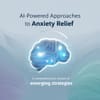As anxiety continues to be one of the most prevalent mental health issues worldwide, new and innovative solutions are needed to address this growing concern. Artificial intelligence (AI) has made significant strides in recent years, and it’s now being applied to the field of mental health in ways that were previously unimaginable. AI-powered tools and strategies are emerging as promising solutions to help individuals manage and alleviate anxiety, offering personalized, data-driven approaches to mental well-being.
One of the most exciting developments in AI for anxiety relief is the creation of virtual therapists and digital companions. These AI-driven platforms use natural language processing (NLP) and machine learning to engage in real-time conversations with users, helping them work through anxious thoughts and emotions. By analyzing speech patterns, word choices, and emotional cues, AI systems can tailor their responses, providing personalized guidance that is both supportive and empathetic. This allows individuals to access mental health support on-demand, without the need for long wait times or in-person appointments.
In addition to virtual therapy, AI is also being integrated into cognitive-behavioral therapy (CBT) programs, which are widely recognized as one of the most effective treatments for anxiety. AI-enhanced CBT apps can help users track their symptoms, identify negative thought patterns, and provide targeted exercises to shift those thoughts towards healthier, more balanced perspectives. These apps can also offer ongoing support through regular check-ins, making it easier for individuals to stay engaged with their mental health journey.
AI's role in mental health doesn’t stop with therapy. It’s also being used to develop tools that assist with mindfulness and relaxation. AI-powered applications can guide users through breathing exercises, meditation sessions, and other relaxation techniques, all personalized to their unique needs and progress. Some apps even use biofeedback sensors to monitor heart rate, skin temperature, or brain waves, providing real-time data that helps users understand how their body responds to anxiety and adjust their strategies accordingly.
Despite these advancements, it’s important to note that AI in mental health is still evolving. Ethical concerns regarding privacy, data security, and the potential for AI to replace human therapists must be carefully considered. While AI tools can supplement traditional therapies, they should not replace the human connection that is often key to successful mental health treatment. As AI continues to improve, there is great potential for it to become an essential tool in the broader mental health care system, but it will be important to strike a balance between technological innovation and the irreplaceable value of human empathy.


